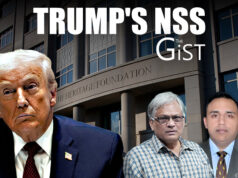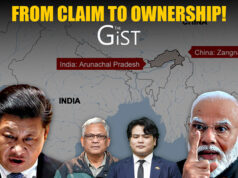Dr Shailesh Nayak is a man who wears several hats with ease and aplomb. While he is mostly known for his work in oceanography, including an early automated warning system for Tsunamis, his areas of interest span ocean science research, policy formulation, and Earth Systems. He’s held top positions as Chairman, Indian Space Research Organisation (ISRO), Secretary, Ministry of Earth Sciences (MoES) and Chairman, Earth Commission, Director, Indian National Centre for Ocean Information Services, Group director, Marine & Water Resources, Space Applications Centre, ISRO, president of Indian Meteorological Society, to name a few.
Today, he is the director of the National Institute of Advanced Studies, Bengaluru, and Chancellor of the TERI School of Advanced Studies, and just a couple of weeks ago, he was honoured with the Padma Shri, the fourth highest civilian award in India, in recognition of his contribution to science.
On the sidelines of DefSAT, a defence and space exposition and conference in New Delhi, he took time out to speak to Ramananda Sengupta on what he means by “Earth as one system,” and how the NIAS, under his leadership, is looking at some of the global and national issues, how science and technology are delivering, and integrating them with social sciences and humanities to address these global issues. “The concept that the earth is a single unit came from satellites because when they started moving around the earth and started giving us a lot of information, we realised that there are processes that are interrelated. What happens in the Arctic affects us, and what happens here can affect the Arctic. Today satellites give us more information on how mass and energy interact with each other, and based on our understanding of that process, we also come to know what are the human activities that affect the process. Or how these processes affect us.”
“Human issues, social issues and science issues, unless we combine all three we cannot solve the problem,” he says. From India’s shift toward renewable energy to China’s problems with the Covid lockdowns, from why Maoists operate only in certain areas and how the political system in Pakistan works, Dr Nayak takes us on a roller coaster ride in this brief but fascinating interview, where he discusses issues as diverse as why do Maoists or Naxals operate only in certain regions of India? Why is it important to conduct a social impact assessment before getting into things like mining and other environmental issues? How does one deal with the problems in Pakistan and China? Watch the full interview to find out.
In a career spanning three decades and counting, Ramananda (Ram to his friends) has been the foreign editor of The Telegraph, Outlook Magazine and the New Indian Express. He helped set up rediff.com’s editorial operations in San Jose and New York, helmed sify.com, and was the founder editor of India.com.
His work has featured in national and international publications like the Al Jazeera Centre for Studies, Global Times and Ashahi Shimbun. But his one constant over all these years, he says, has been the attempt to understand rising India’s place in the world.
He can rustle up a mean salad, his oil-less pepper chicken is to die for, and all it takes is some beer and rhythm and blues to rock his soul.
Talk to him about foreign and strategic affairs, media, South Asia, China, and of course India.




